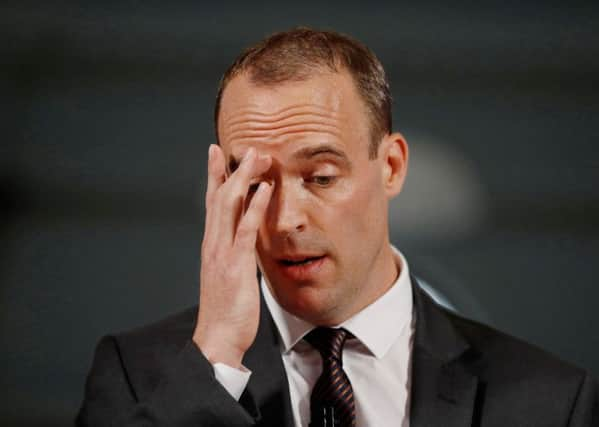Paris Gourtsoyannis: No-deal Brexit plans help politicians be honest


From the easiest trade deal in the world to a promise that you’ll still be able to enjoy a sandwich after Brexit – last week showed the distance we have travelled, and how little there is left to run.
It’s been said that these interesting times have killed off political satire: reality is so much more hilariously unpredictable than anything dreamt up in a writers’ room.
Advertisement
Hide AdAdvertisement
Hide AdWatching Dominic Raab set out how it was a supreme act of responsibility to publish hundreds of pages of plans for a no-deal scenario that every Brexiteer once said was unthinkable, I had a sudden feeling that the last surviving bit of Brexit humour was being killed off.
For those who never heard the Brexit Bulldog sketches on Radio 4, they were a send-up of David Davis’ unshakeable confidence, so his resignation has already put a end to them. But there was delicate balance between realism and absurdity to his promises of securing the best deal in the world before negotiating his way into indentured servitude down a salt mine. It was the unbelievable made just about believeable.
Well, here was the Government calmly and responsibly explaining to the nation how life in the salt mine might look, licking the walls for mineral nourishment. Delivered by a perspiring Raab, a man once described as “a baseball bat in a suit”, the humour is gone. Brexit bulldog has been put down.
In fact, it feels as if the bulldog spirit has gone out of Brexit altogether. The timing wasn’t his fault, but the new Brexit Secretary delivered his first speech and gave his first press conference on no-deal, something the Government insists won’t happen.
Ministers will now struggle to credibly return to the sunny optimism of before, and those who were never particularly optimistic have been released from captivity. Philip Hammond reminded everyone of the Government’s own analysis showing the deep harm that a no-deal exit from the EU would inflict on the economy. Compared to before, the attacks on him were half-hearted. After all, he was only setting out Government analysis of a set of circumstances the Government was unveiling hundreds of pages of plans about.
Publication of the first no-deal papers, with more to follow in the coming weeks, has acted as a release for Brexiteers, too. As time and arguments run out, they can do little else other than say how they really feel.
So last week we heard Jacob Rees-Mogg describe how the failure to find an agreed solution to the Irish border was nothing to worry about, as there were police checks during the Troubles. Barbed wire and soldiers pointing their guns through windows does not promise to be good for business, or the interests of peaceful cooperation. Only a few weeks earlier, Mr Rees-Mogg had been insisting that a technological fix could ensure the free flow of goods and people without harassment or delay.
And last week we also heard the likes of John Redwood, confronted with the possibility that the basic premise of Brexit – a new and better relationship with Europe – might fail, fall back on the old script that critics never wanted the UK to leave the EU anyway. Brexiteers are at last being clear: theirs is a policy that cannot be held to account.
Advertisement
Hide AdAdvertisement
Hide AdNor can politicians on any side hide from the most basic questions – even if they try. The clip of Jeremy Corbyn being asked six times whether he believed that the UK will be better off after Brexit was telling, even though he failed to answer the question. His evasions said all that was needed: no, he does not think it will. Even Dominic Raab’s insistence when asked a variant of the same question – will a no-deal Brexit leave the UK better off? – his answer was revealing. He claimed it would, saying there would be “opportunities” for Britain to exploit. These were hard to ferret out from reading the 150-pages of no-deal advice and preparations. The failure of Brexit talks is evidently an outcome that Raab is willing to accept, regardless of the outcome.
With parliament returning for what will be its most important session since the Iraq War, if not longer, this is the least that we can hope for: that its occupants continue, finally, to say what they really mean, and mean what they say.
